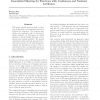Free Online Productivity Tools
i2Speak
i2Symbol
i2OCR
iTex2Img
iWeb2Print
iWeb2Shot
i2Type
iPdf2Split
iPdf2Merge
i2Bopomofo
i2Arabic
i2Style
i2Image
i2PDF
iLatex2Rtf
Sci2ools
ICML
2005
IEEE
2005
IEEE
Generalized skewing for functions with continuous and nominal attributes
This paper extends previous work on skewing, an approach to problematic functions in decision tree induction. The previous algorithms were applicable only to functions of binary variables. In this paper, we extend skewing to directly handle functions of continuous and nominal variables. We present experiments with randomly generated functions and a number of real world datasets to evaluate the algorithm's accuracy. Our results indicate that our algorithm almost always outperforms an Information Gain-based decision tree learner.
Decision Tree Induction | Decision Tree Learner | ICML 2005 | Machine Learning | Problematic Functions |
| Added | 17 Nov 2009 |
| Updated | 17 Nov 2009 |
| Type | Conference |
| Year | 2005 |
| Where | ICML |
| Authors | Soumya Ray, David Page |
Comments (0)

